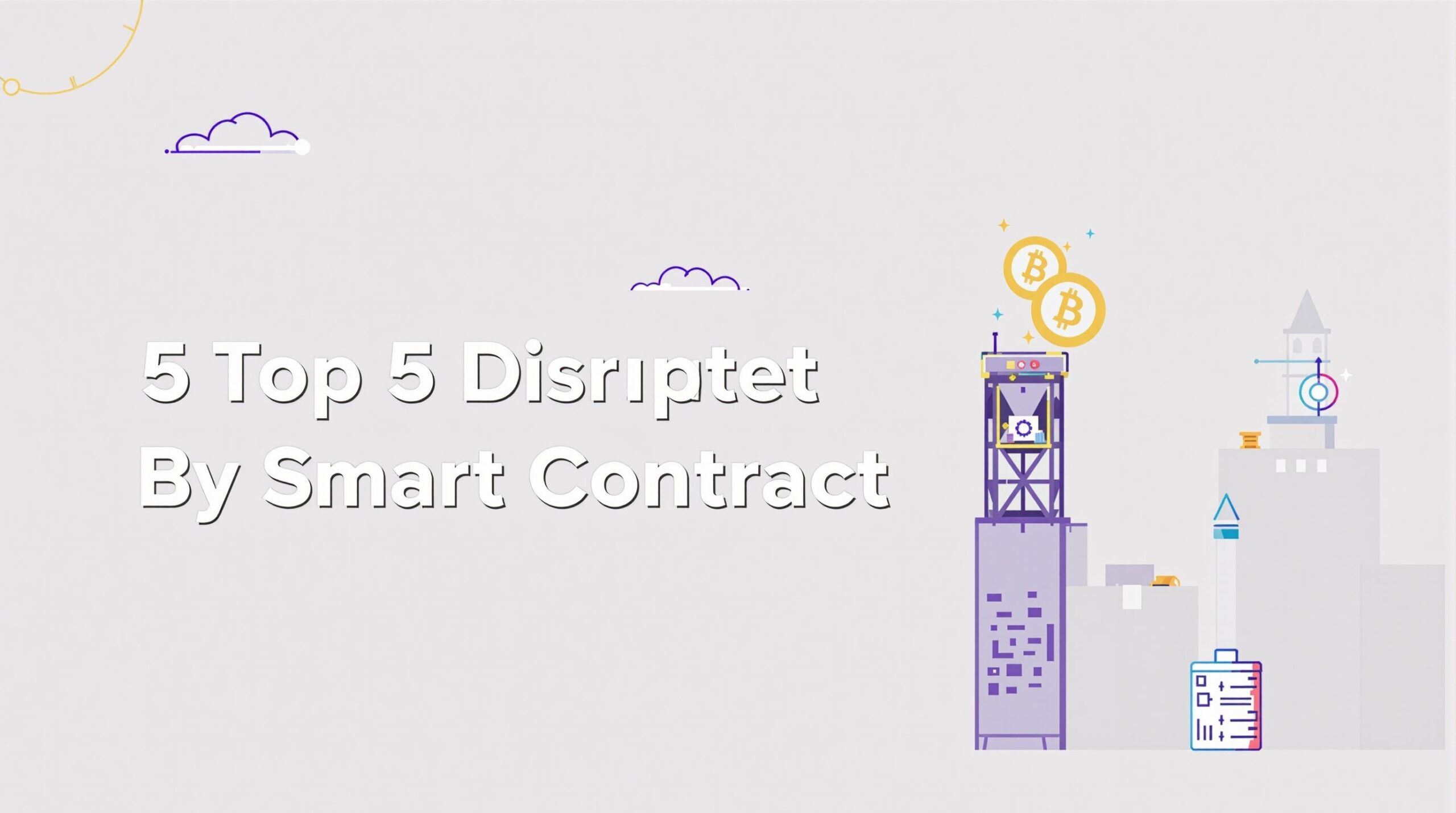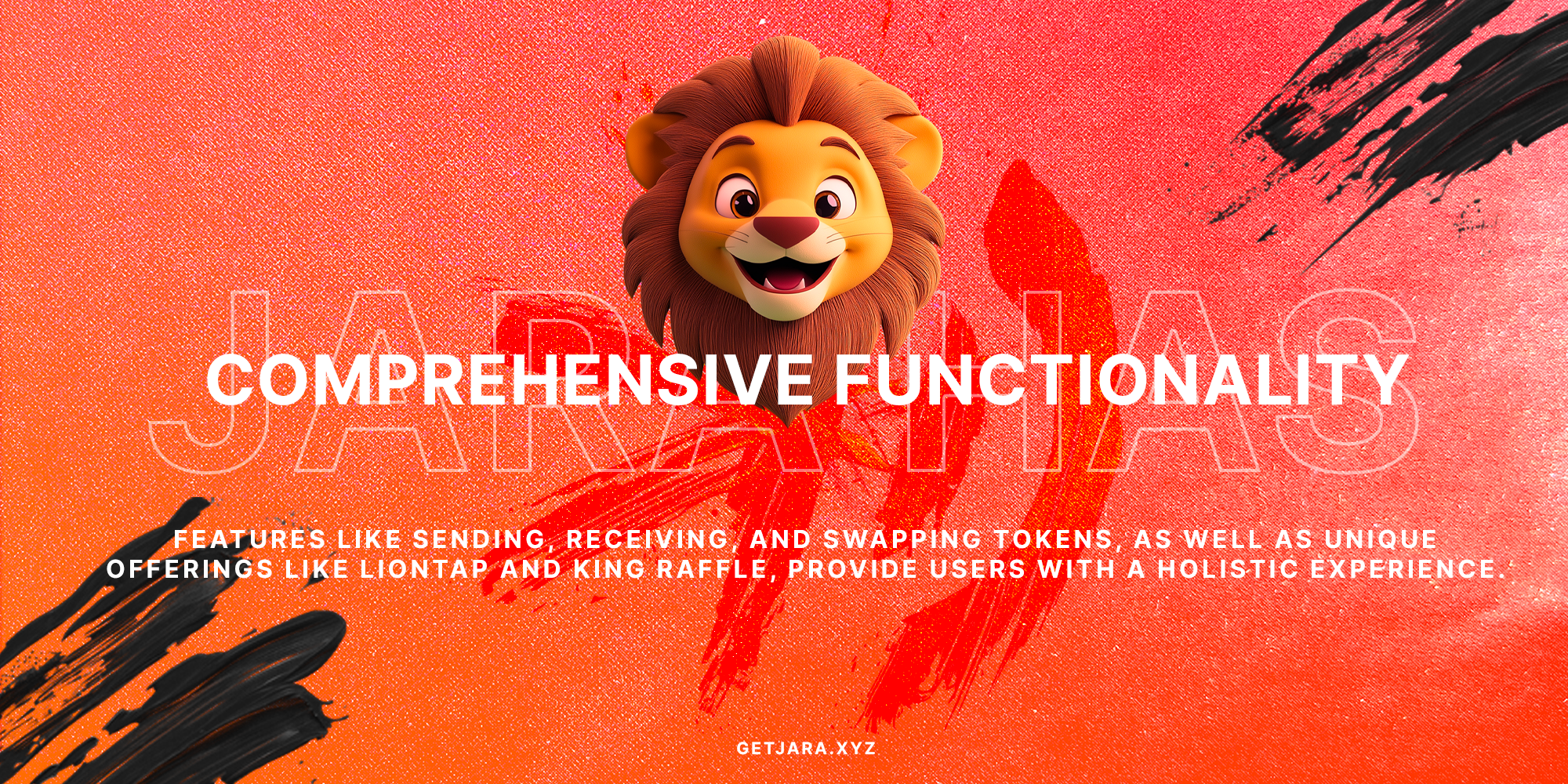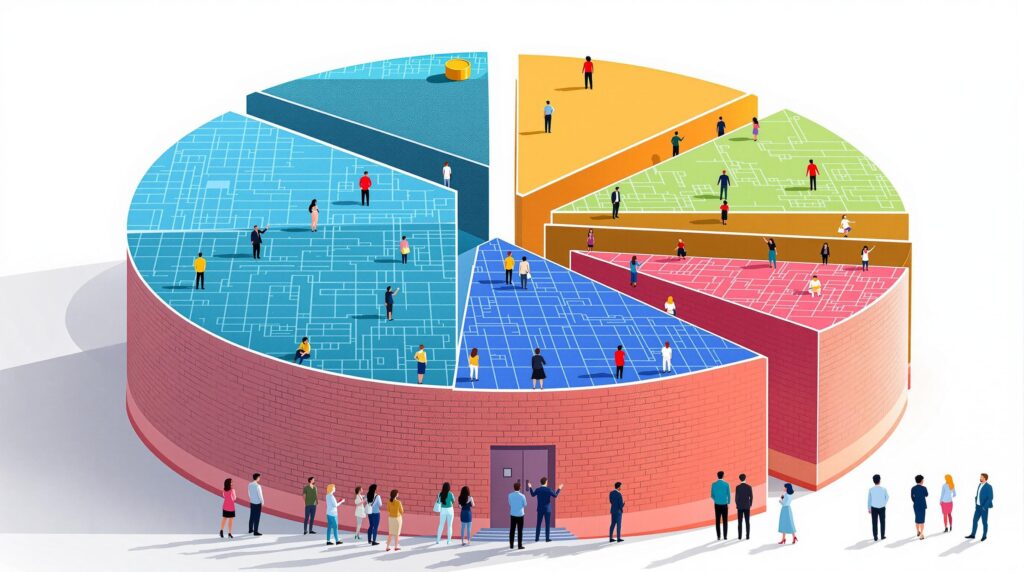Introduction to Smart Contracts and Industry Disruption
Have you ever wondered how smart contracts are changing the game in today’s world? These digital agreements, built on blockchain technology, are reshaping industries by streamlining processes, enhancing efficiency, and promoting transparency. But that’s not all. They’re also minimizing errors and cutting out the intermediaries, which means lower costs and fewer headaches for everyone involved.
Smart contracts are gaining traction due to their ability to automatically execute actions when specific conditions are met. Imagine if your rent could automatically transfer on the due date without you lifting a finger. That’s the power of smart contracts! This kind of innovation is not just futuristic—it’s happening now, right in Africa where the potential for growth is immense.
What is a Smart Contract? A smart contract is an automated, self-executing contract with the terms of the agreement directly written into lines of code across a blockchain network.
One of the standout features of these contracts is their superior security. Because they’re decentralized, they don’t carry the same vulnerabilities associated with traditional contracts, which often fall prey to fraud and manipulation. This is particularly important in financial transactions, where security is paramount.
Moreover, the disruptive nature of smart contracts is vividly apparent in the way they are enhancing transparency in supply chain management. Every participant can view and audit the contract terms on the blockchain, ensuring there are no hidden clauses or sudden changes post-agreement. This transparency leads to a higher level of trust among parties and makes auditing straightforward and efficient.
Another critical characteristic of smart contracts is their precision. Since they run on code, there’s no room for misinterpretation—a problem often encountered in traditional agreements. For businesses, this precision translates into fewer disputes and litigations, saving both time and resources.
On the African continent, where the digital transformation is sweeping across economies, the implication of smart contracts is profound across different sectors. From transforming asset management to pioneering new methods of conducting business, smart contracts stand at the forefront of innovation.
Jara is a prime example of this transformation in action. By leveraging smart contracts within their ecosystem, Jara is bridging global capital with African assets, revolutionizing the way investments and transactions are made. Their tokenization projects exemplify the powerful use of smart contracts in infrastructure development, such as the flagship $6 billion Lagos airport tokenization project.
Jara’s unique approach using $JARA tokens to fuel Africa’s digital asset economy is not just about finance; it’s about forging a new path for economic empowerment across the African continent.
This isn’t just about tech-savvy investors; it’s about everyday users benefiting from a system designed with them in mind. Easy accessibility, enhanced security, and streamlined processes are the new norm. Whether it’s through a seamless, socially integrated wallet or a proprietary L2 blockchain providing low fees and fast transactions, the impact of smart contracts is profound and far-reaching.
We are witnessing a pivotal shift. As these industries continue to embrace smart contracts, the landscape is set for a radical transformation. With the blend of blockchain innovation and the expansive growth potential found within Africa, smart contracts are poised to redefine the future of many sectors. Stay tuned, as this is just the beginning of a revolutionary journey!
Financial Services: Revolutionizing Transactions
The financial services industry is one of the most impacted by smart contracts. Imagine a world where transactions are not only faster but also more secure and transparent. That’s exactly the world that smart contracts are building. They are coded agreements that automatically execute actions based on predefined conditions. But what makes them revolutionary?
What is a smart contract? A smart contract is a self-executing digital agreement with the terms directly written into code. They eliminate the need for third-party intermediaries, ensuring transactions are executed without delays or errors.
How Smart Contracts Improve Financial Services
- Streamlining Settlements: Traditional financial settlements can take several days to finalize. Smart contracts drastically reduce this time by automatically verifying and executing transactions, making processes faster and error-free. This advancement builds trust, as highlighted in an article on trustless agreements.
- Automating Insurance Claims: Filing insurance claims can be cumbersome and time-consuming. Smart contracts streamline this process by automatically triggering once certain conditions are met, such as weather data confirming storm damage, and completing payouts without manual intervention.
- Decentralized Finance (DeFi): Smart contracts are pivotal in DeFi, allowing for peer-to-peer lending and borrowing without traditional banks. This decentralization ensures more people have access to financial services, which is particularly significant in underbanked regions.
But smart contracts do more than just speed up processes—they enhance transparency, a crucial factor in financial transactions. Every step of the transaction process is recorded on the blockchain, providing a clear audit trail. This feature significantly reduces the risk of fraud. For more insights into how smart contracts are reshaping finance, you can explore further here.
The Impact on African Financial Markets
In Africa, smart contracts hold an even more transformative potential. With the launch of initiatives like Jara, which aims to fuel the continent’s digital asset economy, smart contracts are set to redefine how capital flows into African markets. By converting illiquid assets into globally accessible tokens, platforms like Jara bridge a crucial gap between local potential and international investment.
- Tokenized Infrastructure Projects: Africa’s vast infrastructure gap presents both a challenge and an opportunity. Smart contracts facilitate the tokenization of projects like the Lagos airport, opening up global investment opportunities in previously inaccessible areas.
- Financial Inclusion: By leveraging smart contracts, platforms like Jara make financial services accessible to a wider audience, providing tools for financial independence and empowerment.
This technological leap forward isn’t without its challenges. Questions about the legal status of smart contracts and their enforceability in various jurisdictions remain, but ongoing regulatory discussions and advancements are paving the way for broader acceptance and integration.
“Invest in $JARA: Fuel Africa’s $200B+ Digital Asset Economy and Participate in a Revolutionary Ecosystem.” This is more than just a financial move; it’s a step toward greater socio-economic equality.
Smart contracts aren’t just changing how transactions occur; they’re altering the foundations of financial services. These changes offer enormous potential for growth in Africa’s digital economy, aligning with Jara’s mission to empower and create opportunities through innovation. As more entities adopt this technology, the effectiveness of financial ecosystems will only increase.
To understand the broader landscape of how smart contracts are shaping not only finance but other sectors as well, explore our comprehensive overview here.

Real Estate: Streamlining Property Transactions
In the ever-evolving world of property transactions, smart contracts are proving to be game-changers. Traditionally, buying or selling real estate has been a labor-intensive process involving multiple intermediaries like agents, lawyers, and escrow companies. These transactions often take weeks, if not months, to finalize. However, smart contracts can now automate many of these functions, making the entire process faster and more cost-effective.
What are smart contracts? Smart contracts are self-executing contracts with the terms of the agreement directly written into lines of code, operating on blockchain technology.
By using smart contracts, tasks such as title transfers, escrow, and agreement validation can be automated. This automation reduces the time and costs involved, enabling more transparent transactions. Imagine closing on a home sale without needing to chase down each stakeholder for their signature. The contract just executes itself once all predefined conditions are met!
The use of smart contracts in real estate is not just theorizing the future; it’s already being implemented. For example, the automation potential of these contracts makes the need for intermediaries less essential. This doesn’t mean real estate agents will become obsolete; rather, their roles will evolve towards providing more value-added services focused on strategic advice rather than logistical coordination.
In a traditional sale, both buyers and sellers can feel frustrated by the extended time it involves. Smart contracts, however, can halve processing times.
Legal aspects also benefit from automation. Legal validation via code reduces room for dispute over what was agreed upon. Contracts on a blockchain are immutable, which means once they are set, they cannot be altered without mutual consent. This aspect offers unprecedented security and trust.
Moreover, platforms like Jara are embracing these technologies to leverage Africa’s digital transformation. By offering a seamless, socially integrated wallet, Jara Wallet is positioning itself as a crucial player in the African market. This encompasses not just real estate, but various sectors where tokenization of assets can flip the traditional paradigms.
Smart contracts promise a future where real estate transactions are as simple as sending an email. This could especially benefit emerging markets in Africa, where the infrastructure for real estate transactions is still developing. As the digital assets economy grows, tools like Jara’s ecosystem, powered by the $JARA token, could be foundational to this change.
With smart contracts simplifying the property transaction process, the days of lengthy delays and high intermediary costs are numbered. The real estate industry, not just in Africa but worldwide, is on the brink of transformation—one smart contract at a time.
Supply Chain Management: Enhancing Efficiency and Transparency
Improving Traceability and Accountability
Smart contracts are not just another tech buzzword; they are revolutionizing the supply chain industry. By allowing transparent and traceable transactions, smart contracts pave the way for enhanced accountability. Imagine a world where every movement of a product is recorded and verified in real-time. Such a level of transparency assures consumers that they are getting what they paid for and where it came from. This is not just a dream but a reality made possible by smart contracts.
Smart contracts act as digital agreements that execute when specific conditions are met. Their self-executing nature offers a reliable way to ensure that all parties in a supply chain transaction adhere to agreed terms, reducing the risk of fraud and human error. This innovation is vital, especially in industries where traceability is essential for regulatory compliance and customer satisfaction.
What is a Smart Contract? A smart contract is a self-executing contract with the terms of the agreement directly written into lines of code. They operate on blockchain technology, ensuring transparency and immutability.
For businesses, this means that issues like counterfeiting and contaminated goods can quickly be identified and addressed. With the ability to track and trace the journey of goods, companies can swiftly remove dubious or faulty products from circulation. Such measures help build customer trust and protect brand reputation, essential components in today’s competitive marketplace.
Reducing Operational Costs
One of the most appealing aspects of utilizing smart contracts in supply chain management is the potential for significant cost savings. By eliminating intermediaries and streamlining processes, companies can drastically reduce operational costs. For instance, transaction verification and approval, traditionally handled by banks or third-party service providers, can be automated. This automation eliminates fees and reduces time delays associated with manual handling of documents.
- Streamlined Processes: With smart contracts handling transactions automatically, businesses can reduce administrative burdens and accelerate the pace of their operations.
- Eliminated Intermediaries: By cutting out the middlemen, companies can save on costs and avoid the potential for human error. This financial efficiency creates a more agile supply chain.
- Real-time Payment Settlement: Payments can be instantly settled upon fulfillment of contract stipulations, enhancing cash flow and reducing financial strain. Discover more on business automation with smart contracts.
Smart contracts also offer the added benefit of secure, immutable records, which are crucial for audits and regulatory compliance. Every transaction is permanently recorded on the blockchain, facilitating a transparent and accurate audit trail. This capability can simplify and expedite audits and regulatory reviews, saving both time and resources for businesses.
“Supply chains of the future will be defined by transparency and speed. Smart contracts are leading this charge by providing clarity and efficiency at every transaction point.” – Industry Insider
Driving Sustainability
In today’s eco-conscious world, companies are under increasing pressure to demonstrate sustainable practices. Smart contracts support sustainability initiatives by providing verified data on product origins and the processes involved in their creation. By ensuring that all links in the supply chain are compliant with environmental regulations, companies can demonstrate their commitment to sustainability. This is crucial in enhancing brand loyalty and meeting the growing consumer demand for ethical business practices.
Moreover, smart contracts versus traditional contracts allow for increased agility in responding to supply chain disruptions caused by unforeseen circumstances like natural disasters. By quickly adapting and reallocating resources, smart contracts facilitate a more resilient supply chain capable of overcoming challenges without sacrificing efficiency or ethical standards.
The future of supply chain management is intertwined with technological advancements. As industries adopt smart contracts, a reduction in fraud and increased sustainability are no longer dreams but achievable goals. With such capabilities, smart contracts are poised to reshape the current paradigm, offering businesses robust tools to remain competitive and efficient in an ever-evolving marketplace.

How are smart contracts changing the healthcare industry?
Smart contracts in the healthcare industry are automating processes like patient consent management and insurance claims. These contracts ensure accuracy and accelerate administrative tasks, leading to fewer errors and faster healthcare service delivery. Additionally, they enhance data security by preventing unauthorized access, fostering patient trust and compliance.
What role do smart contracts play in the logistics sector?
Smart contracts are revolutionizing the logistics sector by automating tracking and delivery verification processes. They enhance supply chain visibility by providing real-time data sharing across all stakeholders, which reduces delays and errors, ensuring timely and accurate delivery of goods. Furthermore, by minimizing paperwork, they cut down on operational costs.
Can smart contracts improve the energy industry?
Yes, smart contracts can greatly improve the energy industry by enabling decentralized energy trading and efficient grid management. By facilitating peer-to-peer energy exchanges and automating billing, they promote renewable energy usage and optimize electricity distribution. This leads to better energy management and reduction in carbon footprint.
How do smart contracts affect the legal industry?
Smart contracts affect the legal industry by automating traditional contract execution and reducing the need for intermediary services. This leads to quicker contract fulfillment and reduced legal costs. Legal professionals can focus more on complex advisory roles rather than routine contract management. However, new legal challenges in terms of enforcement and security must also be addressed.

Additional Practice Areas We Serve
Explore other areas related to smart contracts and discover how they are transforming various industries.
Hear From Our Satisfied Clients
At the forefront of our Smart Contracts & Automation practice is a deep-seated commitment to client satisfaction. Each case is handled with utmost care, as echoed in the appreciative feedback from those we represent. Stellar reviews are what make us consistently one of Central Florida’s top-rated Smart Contracts & Automation law firms. You can read more 5-star reviews here.

Embrace the Future with Expert Guidance
The world is rapidly evolving with the implementation of smart contracts, transforming industries from financial services to supply chain management. Ready to explore how smart contracts can revolutionize your business? Partner with us to navigate these technological advancements with confidence.
Contact us at [email protected] today for a personalized consultation!
Discover why we’re trusted by many:
- JARA Award: Recognized as a leader in Smart Contract Innovation by Blockchain Excellence in 2023. Learn more
- Top Rated: Listed among the “Best Legal Advisors in Supply Chain Automation” for 2023 by Industry Innovators. Learn more
- Industry Recognized: Highlighted as a top firm in “Blockchain Legal Services” by Tech Awards 2023. Learn more
- Expertise Honored: Among the top firms for “Smart Contract Consultation” by DeFi Awards 2023. Learn more
- Innovation Leader: Celebrated as a pioneer in “Digital Agreement Technology” by FutureTech in 2023. Learn more
Join the ranks of successful companies leveraging smart contracts today!
Chinyere “Chi” Nnadi Bio
Founder and CEO, Jara | Expert in Blockchain Disruption
Content Reviewed by Chi Nnadi and his Content Team. Chi is an experienced entrepreneur dedicated to transforming Africa’s financial ecosystem through blockchain technology. As Founder and CEO of Jara, he builds enterprise-grade infrastructure converting illiquid African assets into globally accessible digital tokens. With his proprietary Layer-2 blockchain technology, Chi bridges the gap between global investors and Africa’s growing digital asset market.

















